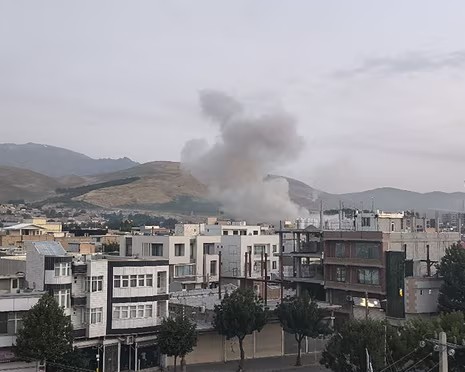Middle Eastern tensions erupted into open confrontation as Israeli forces launched air strikes against key Iranian nuclear sites, with Iranian state media confirming the death of Revolutionary Guards commander Hossein Salami in the aftermath. The strikes, which hit facilities in Natanz, Isfahan and other strategic locations, mark the most serious military escalation between the two regional adversaries in over a decade.
The operation, reportedly involving drones and precision-guided munitions, was described by Israeli officials as a “pre-emptive strike” against Iran’s accelerating nuclear programme. According to the Israeli Defence Forces, the attack targeted underground enrichment infrastructure, advanced centrifuge halls, and military bases allegedly involved in nuclear development. Damage assessments remain limited, but satellite analysis suggests key sites suffered significant disruption.
Iranian state news agency IRNA later confirmed the death of Major General Hossein Salami, commander-in-chief of the Islamic Revolutionary Guard Corps (IRGC), in what it described as a “cowardly act of aggression”. Salami, who led Iran’s military posture against the West and Israel for nearly a decade, was reportedly killed during a high-level inspection of one of the bombed facilities near Isfahan. His death is expected to further inflame Iranian nationalist sentiment and intensify military retaliation.
Iran’s government has placed its forces on full alert, with President Ebrahim Raisi declaring three days of mourning and vowing that “the enemies of the Islamic Republic will pay dearly”. While Iranian officials initially downplayed the physical damage to nuclear infrastructure, the admission of Salami’s death marks a serious blow to Tehran’s military leadership and signals the gravity of the situation.
Israel, meanwhile, has reinforced its northern and central air defences in anticipation of reprisal attacks. Prime Minister Benjamin Netanyahu said the strikes were a “decisive and necessary” response to what he described as “unmistakable signs” that Iran was preparing to cross the nuclear threshold. Netanyahu added that the international community had failed to restrain Iran diplomatically and that Israel was now acting independently to ensure its survival.
The White House has urged both nations to avoid further escalation, while reiterating its support for Israel’s right to self-defence. European governments have called emergency security meetings to assess the fallout, with French President Emmanuel Macron warning of the risk of “uncontrollable regional war”. Crude oil prices surged by over 8% within hours, and global markets reacted nervously to the possibility of prolonged instability in the Gulf region.
Hossein Salami’s death marks a profound moment for the Islamic Republic. As a symbol of the IRGC’s defiance and ideological resolve, his loss may harden Iran’s stance both domestically and abroad. Analysts now fear that diplomacy has been all but eclipsed, and that both nations are poised for a cycle of retaliation with global consequences.
With nuclear facilities smouldering and a senior commander lost, Iran must now decide whether to strike back quickly or build toward a longer-term, more strategic response. Either course threatens to redraw the geopolitical lines in the region—and place the world on edge.
newshub finance


Recent Comments